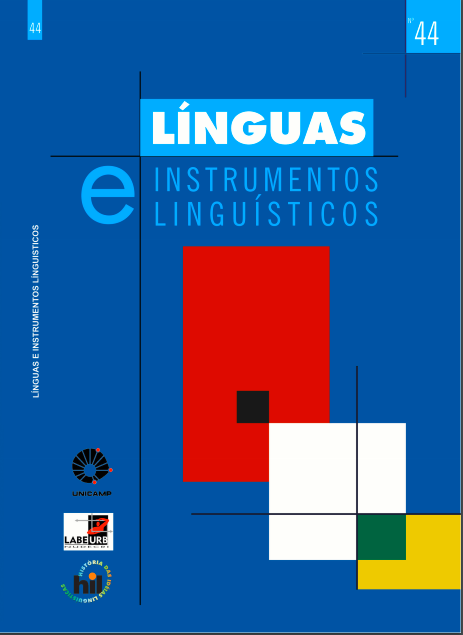Abstract
This paper aims to present some considerations on the process of institutionalization and disciplinarization of the History of Linguistic Ideas (HIL) in Brazil and in France, especially the one emerging from the articulation with French Discourse Analysis (AD). To do so, three are the guiding questions to be answered: 1) what kind of articulation is held between HIL and AD?; 2) how is established the relationship between the position of the discourse analyst and the one of the historian of the linguistic ideas?; and 3) what is the difference between History of the Linguistic Ideas and Linguistic Historiography?
References
AUROUX, S. (2009). A revolução tecnológica da gramatização (1992). Trad. Eni P. Orlandi. Campinas, SP: Editora da UNICAMP. 2ª. ed.
AUROUX, S. (1988). "Pour une histoire des idées linguistiques". In: Revue de Synthese: IV' S. n.3-4, p.429-441.
BALDINI, L. et. al. (2018). “História das ideias linguísticas e análise do discurso: o corte epistemológico”. In: Fragmentum n.52. Santa Maria: Editora Programa de Pós-Graduação em Letras, UFSM, p.15-33.
COLOMBAT, B.; FOURNIER, J.M et PUECH, C. (2010). Histoire des idées sur le langage et les langues. Paris: Kliincksieck.
FERREIRA, A. C. F. (2018). “A Análise de Discurso e a constituição de uma História das Ideias Linguísticas do Brasil”. In: Fragmentum n.Especial. Santa Maria: Editora Programa de Pós-Graduação em Letras, UFSM, p.17-47.
HENRY, P. (2010). “A História não Existe?”. In: Gestos de Leitura: da História no Discurso. Campinas: Editora da Unicamp, p.23-48.
HORTA NUNES, J. (2008). “Uma articulação da análise de discurso com a história das ideias linguísticas”. In: SCHERER, Amanda E.;
PETRI, V. (Orgs.). Língua, Sujeito e História. v.18. n.37. Santa Maria, UFSM: Programa de pós-graduação em Letras, p.107-133.
KOERNER, K. (1978). “Four types of history writing in linguistics”. In: Toward a historiography of linguistics selected essays. Amsterdam: Jonh Benjamins B.V., p.55-69.
KOERNER, K. (1996). “Questões que persistem em historiografia linguística”. In: Revista Anpoll, n.2, p.45-70.
KOERNER, K. (2014). “História da linguística”. In: Revista Confluência. n.46. Rio de Janeiro, p.9-22.
KUHN, T. (1983). La strutucture des révolutions scientifiques (19621970). Paris: Flammarion.
MARIANI, B. (1998). O PCB e a imprensa: os comunistas no imaginário dos jornais (1922-1989). Rio de Janeiro: Revan; Campinas, SP: UNICAMP.
MITTMANN, S. (2010). “Heterogeneidade constitutiva, contradição histórica e sintaxe”. In: Revista do Programa de Pós-Graduação em Letras da Universidade de Passo Fundo, v.6, n.1, p.85-101.
ORLANDI, E. (2003). “Vão surgindo sentidos”. In: Discurso Fundador. Campinas, SP: Pontes. 3ª ed.
ORLANDI, E (org.). (2001). História das idéias linguísticas: Construção do saber metalinguístico e a constituição da língua nacional. Campinas, SP: Pontes e Cáceres, MT: Unemat Editora.
ORLANDI, E. (2005). “A Análise de Discurso em suas diferentes tradições intelectuais: O Brasil”. In: I Seminário de Estudos em Análise do Discurso (SEAD). Porto Alegre, Anais. Porto Alegre: UFRGS. Disponível em: http://www.ufrgs.br/analisedodiscurso/anaisdosead/1SEAD/Confere ncias/EniOrlandi.pdf. Acesso em: 20 de junho de 2015.
ORLANDI, E.; GUIMARÃES, E. (1996). Língua e cidadania: O português no Brasil. Campinas, SP: Pontes.
ORLANDI, E.; GUIMARÃES, E. (2002). Institucionalização dos estudos da linguagem: a disciplinarização das ideias linguísticas. Campinas, SP: Pontes.
PÊCHEUX, M.; FUCHS, C. (2010). “A propósito da análise automática do discurso: atualização e perspectivas (1975)”. In: GADET, F.; HAK, T. (Org.). Por uma análise automática do discurso: uma introdução à obra de Michel Pêcheux. Campinas: Editora da UNICAMP, p.163-252.
PÊCHEUX, M. (2006). Discurso: estrutura e acontecimento. Campinas, SP: Pontes.
PUECH, C. (Org.). (2006). “Histoire des idées linguistiques et Horizons de rétrospection". Vol.1. In: Histoire Epistémologie Langage, t.XXVIII 1. SCHERER, A.E.; SOUSA, L.M.A.; MEDEIROS, V.; PETRI, V. (2014). “O lugar dos estudos franceses na constituição de uma memória da Análise de Discurso no Brasil”. In: Letras, Santa Maria, v.24, n.48, p.13-28.
SWIGGERS, P. (1998). “Filologia E Lingüística: enlace, divórcio, reconciliação”. In: Filologia e Lingüística Portuguesa, n.2, p.5-18.
SWIGGERS, P. (1996). “Jean‑François Thurot”. In: STAMMERJOHANN, H. (Ed.). Lexicon grammaticorum: Who’s who in the history of world linguistics. Tübingen: Max Niemeyer Verlag, p.918‑919.
SWIGGERS, P. (2010). “História e historiografia da linguística: status, modelos e classificações”. In: Revista Eutomia, Ano III, v. 2.
ZOPPI-FONTANA, M. G.; DINIZ, L. (2008). “Declinando a língua pelas injunções do mercado: institucionalização do português língua estrangeira (PLE)”. In: Estudos Lingüísticos, São Paulo, 37 (3), p.89119.
ZOPPI-FONTANA, G. (2013). “Presentación: Análisis del discurso en Brasil: teoría y práctica”. In: Signo y Seña, n. 24, p.3-9.
https://creativecommons.org/licenses/by-nc-sa/4.0/
Línguas e Instrumentos Linguísticos has a Creative Commons (CC license, preserving the integrity of the articles in an open access environment – to copy and reproduce the material in any means or format; adapt – remix; transform and build over the material. The journal remain with the rights to publish without restrictions.


